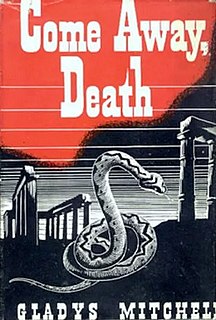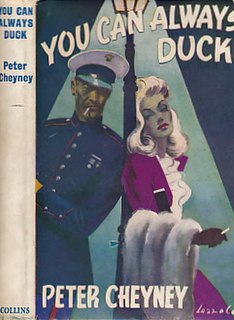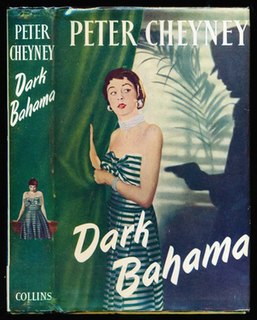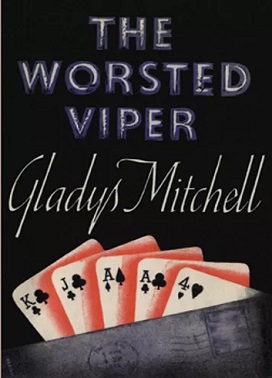Inspector Joseph French is a fictional British private detective created by Freeman Wills Crofts. He was one of the prominent detectives of the Golden Age of Detective Fiction, appearing in twenty nine novels and a number of short stories between 1924 and 1957. French is a Scotland Yard detective, whose methodical technique breaks down complex alibis. Over the series he is promoted to Chief Inspector and the later to Superintendent. His manner is courteous, he is a happily married and has no major problems in in his private life. The series relied largely on puzzle mysteries.

The Crozier Pharaohs is a 1984 mystery detective novel by the British writer Gladys Mitchell. It is the sixty sixth and last in her long-running series featuring the psychoanalyst and amateur detective Mrs Bradley. The series stretched back to the debut novel Speedy Death in 1929, during which time Bradley had barely aged or changed except for acquiring a damehood. It was published posthumously following Mitchell's death the previous year.

The Missing Partners is a 1928 mystery detective novel by the British writer Henry Wade. It was his second novel following his successful debut The Verdict of You All in 1926.

Come Away, Death is a 1937 mystery detective novel by the British writer Gladys Mitchell. It is the eight in her long-running series featuring the psychoanalyst and amateur detective Mrs Bradley. Although the plot revolves around Greek Mythology, the title is taken from a line from Shakespeare's Twelfth Night. It was followed by a loose sequel Lament for Leto in 1971.

Laurels are Poison is a 1942 mystery detective novel by the British writer Gladys Mitchell. It is the fourteenth in her long-running series featuring the psychoanalyst and amateur detective Mrs Bradley. It was Mitchell's own favourite among her novels and has been considered her best by other critics. It introduced the character of Laura Menzies who became recurring assistant of Mrs Bradley in subsequent novels.

G-Man at the Yard is a 1946 thriller novel by the British writer Peter Cheyney. It is the final entry in the popular series of novels featuring the FBI agent Lemmy Caution. It was republished posthumously in 1953 following his death in 1951, now also including three short stories. Unlike many other novels by Cheyney it was never made into a film.

I'll Say She Does is a 1945 thriller novel by the British writer Peter Cheyney. It is the tenth in his series of novels featuring the FBI agent Lemmy Caution. Later editions of the book are generally titled I'll Say She Does!

You Can Always Duck is a 1943 thriller novel by the British writer Peter Cheyney. It is the ninth in his series of novels featuring the FBI agent Lemmy Caution. The action takes place in wartime London where Caution is on the trail of a gang of black marketeers who have got mixed up in espionage. It was one of a number of films and novels of the period that made use of the booming black market for their setting.

Never a Dull Moment is a 1942 thriller novel by the British writer Peter Cheyney. It is the eight in his series of novels featuring the FBI agent Lemmy Caution. Cheyney had become known for his hardboiled style, similar to that of Raymond Chandler.

Your Deal, My Lovely is a 1941 thriller novel by the British writer Peter Cheyney. It is the seventh in his series of novels featuring the FBI agent Lemmy Caution. Much of the action takes place in wartime London. Caution is called in to investigate the disappearance of a prominent scientist.

You'd Be Surprised is a 1940 thriller novel by the British writer Peter Cheyney. It is the sixth in his series of novels featuring the FBI agent Lemmy Caution. Unlike several of the others it has not been adapted for film.

Dark Bahama is a 1950 thriller novel by the British writer Peter Cheyney. It was the second in a trilogy featuring the private detective Johnny Vallon, a hard-drinking former army officer. The story also features Quale, the head of British intelligence who appears on several other novels by Cheyney. Much of the action takes place in a fictional island in the Bahamas and nearby Miami in Florida.

Lady, Behave! is a 1950 thriller novel by the British writer Peter Cheyney. It was the third part in a trilogy featuring Johnny Vallon, a hard-drinking former army officer now working as a private detective.

The Cask is a 1920 detective novel by the Irish-born writer Freeman Wills Crofts. His debut novel, it is considered his masterpiece. Long after the author's reputation had declined, this book was still hailed by critics as a cornerstone of the genre Crofts had been working as a railway engineer before writing the novel, but its success launched him as one of the leading writers of the Golden Age of Detective Fiction. He later went on to create the character of Inspector French of Scotland Yard who appeared in a long-running series of novels.
Lynn Brock (1877-1943) was the pseudonym of the Irish writer Alister McAllister, who moved to England and wrote a series of mystery novels. Brock is best known for his series of Colonel Gore detective novels, which enjoyed popularity in the 1920s and 1930s during the Golden Age of Detective Fiction. His novels employ a complexity of style and are generally set in rural locations. He also wrote several plays under the name Anthony Wharton.

The Murder on the Burrows is a 1931 detective story by E.C.R. Lorac, the pen name of the British writer Edith Caroline Rivett. Her debut novel, it introduced the character of Chief Inspector MacDonald of Scotland Yard who went on to appear in a lengthy series of novels during the Golden Age of Detective Fiction. Although initially named James this is changed to Robert in later books. It takes around Bideford Bay in North Devon where the author had spent several holidays.

The Worsted Viper is a 1943 detective novel by the British writer Gladys Mitchell. It is the fifteenth in her long-running series featuring the psychoanalyst and amateur detective Mrs Bradley. Bradley was one of a number of investigators active during the Golden Age of Detective Fiction. Much of the novel takes place on the Norfolk Broads.

Found Floating is a 1937 detective novel by the Irish writer Freeman Wills Crofts. It is the sixteenth in his series of novels featuring Inspector French, a Scotland Yard detective of the Golden Age known for his methodical technique.

The Box Office Murders is a 1929 detective novel by the Irish-born writer Freeman Wills Crofts. It is the fifth in his series of novels featuring Inspector French, a prominent figure of the Golden Age of Detective Fiction. It was published in the United States the same year by Harper under the alternative title The Purple Sickle Murders.

Death in the Hopfields is a 1937 detective novel by John Rhode, the pen name of the British writer Cecil Street. It is the twenty fifth in his long-running series of novels featuring Lancelot Priestley, a Golden Age armchair detective. It was published in America by Dodd Mead under the alternative title The Harvest Murder.


















